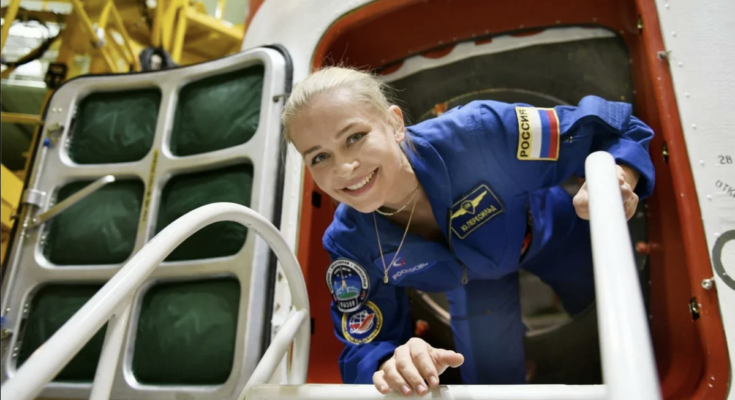
A Roscosmos Soyuz rocket is scheduled to launch Tuesday morning from the Baikonur cosmodrome, sending a Russian film crew and one cosmonaut to the International Space Station. Here are the details of the mission and how you can watch the launch online.
This has been a very eventful year in space, as U.S. companies Virgin Galactic, Blue Origin, and SpaceX all managed to send tourists to the final frontier for the very first time. For Russia, this is old hat. Back in 2001, Roscosmos successfully transported U.S. millionaire Dennis Tito to the ISS, who dished out a cool $20 million for the historic flight.
Roscosmos is now looking to try something a bit different. The Russian space agency is sending a director and actress to the ISS, where they will film scenes for an upcoming film titled Vyzov, or Challenge in English (a literal translation would be The Call, for what it’s worth). The film is a joint project involving Roscosmos, Channel One, and Yellow, Black and White studio.
Director Klim Shipenko, 37, and actress Yulia Peresild, 35, along with cosmonaut Anton Shkaplerov, 49, are scheduled to launch aboard a Soyuz-2.1a rocket on October 5 at 11:55 a.m. Moscow time (4:55 a.m. EDT or 1:55 a.m. PDT). Channel One will provide livestreams of the launch on its website and on Youtube (below). Roscosmos will also have a feed available.
The spacecraft should reach the ISS three hours and 17 minutes after launch, which is pretty fast, as far as these things go. Shkaplerov will join the Expedition 66 crew and stay until March of next year, while Shipenko and Peresild will stay on the ISS for at least 12 days, with a tentative return scheduled for October 17.
G/O Media may get a commission
The filmmakers are hoping to amass between 35 and 40 minutes of footage during their brief stay. Peresild will portray Zhenya—an operating surgeon who has just one month to prepare for a flight to the ISS, where she will attempt to save an ailing cosmonaut’s life. She was chosen for the role following an open competition and after successfully completing physical and medical exams. Runner-up Alyona Mordovina is serving as the backup actress for the mission. Novitsky will play the role of the cosmonaut who needs medical assistance, according to Russia’s state-run TASS news agency.
Using the ISS as a film set is guaranteed to provide an authentic sense of what it’s like to live and work in space. The closest precedent to this is Apollo 13, in which the microgravity scenes were shot inside NASA’s KC-135 aircraft, which is famously known as the “vomit comet.” Because stints of weightlessness were limited to 25 seconds, the cast and crew had to perform 612 flight parabolas to capture the required footage. Needless to say, this won’t be an issue on the ISS, where microgravity is in abundance.

For the past several months, the film crew has been preparing at the Gagarin Cosmonaut Training Center facility at the Baikonur Cosmodrome in Kazakhstan.
“We underwent an accelerated course of many important elements that the cosmonauts study over many years. We tried to master them in four months. Of course, this is very fast. We had a lot of theory, practice, endurance, sports—everything imaginable,” Shipenko told TASS. The point, he said, was to not attain the training of a full-fledged cosmonaut, but “to prepare as a participant of a space flight.”
As part of their training, the film crew, along with their respective backups, studied the design of the Soyuz spacecraft and the Russian segment of the ISS. They also received emergency response training, which included simulated water landings and weightlessness training aboard a zero-g aircraft. As TASS reports, Peresild “hadn’t realized how much effort the preparation for the project would require,” but even with hindsight she wouldn’t have given up the opportunity.
The Roscosmos website describes it as a “scientific and educational project,” but as the Russian space agency admitted last year, the “movie is aimed to popularize Russia’s space activities” and to “glorify [the] cosmonaut profession.” Some Russian scientists and former cosmonauts have complained about the mission, saying the film is diverting resources that could’ve been used elsewhere. As of late August, the producers were still seeking funding for the project.
More: New Cracks on ISS Expose Deteriorating State of Russian Segment.



